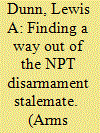| Srl | Item |
| 1 |
ID:
138947


|
|
|
|
|
| Summary/Abstract |
Russia, the United Kingdom and the United States extended security assurances to Ukraine in December 1994 in an agreement that became known as the Budapest Memorandum. This agreement was part of a package of arrangements whereby Ukraine transferred the Soviet-made nuclear weapons on its territory to Russia and acceded to the Treaty on the Non-Proliferation of Nuclear Weapons (NPT) as a non-nuclear weapon state (NNWS). Russia's violations of the Budapest Memorandum, notably its annexation of Crimea, could have far-reaching implications for nuclear non-proliferation and disarmament because of the questions that Russia's behaviour has raised about the reliability of major-power security assurances for NNWS parties to the NPT. Doubts about the reliability of such assurances could create incentives to initiate, retain or accelerate national nuclear weapons programs. Moreover, because the Budapest Memorandum included restatements of UN Charter provisions and principles articulated in the Helsinki Final Act of the Conference on Security and Co-operation in Europe, Russia's disregard for the Budapest Memorandum has raised fundamental questions about the future of international order. The Russians have demonstrated that, despite economic sanctions and international condemnation, they are prepared to disregard longstanding legal and political norms, including those expressed in the Budapest Memorandum, in pursuit of strategic and economic advantages and the fulfilment of national identity goals. Unless Russia reverses its dangerous course, the fate of the Budapest Memorandum may in retrospect stand out as a landmark in the breakdown of international order.
|
|
|
|
|
|
|
|
|
|
|
|
|
|
|
|
| 2 |
ID:
138548


|
|
|
|
|
| Summary/Abstract |
On the eve of the 2015 Nuclear Nonproliferation Treaty (NPT) Review Conference, there is a stalemate on nuclear disarmament issues between the NPT non-nuclear-weapon states and nuclear-weapon states. That stalemate is typified by controversy over the new focus of the non-nuclear-weapon states on the humanitarian impact of nuclear weapons; lack of agreement among NPT parties on how best to advance nuclear disarmament, heightened by widespread frustration with the slow pace of achieving the nuclear disarmament goals of Article VI of the NPT; and the attraction of calls to negotiate a nuclear weapons ban even without the participation of the nuclear-weapon states. The review conference is an opportunity for all NPT parties to agree on a way forward to break this stalemate and advance cooperatively the treaty’s goal of nuclear disarmament.
|
|
|
|
|
|
|
|
|
|
|
|
|
|
|
|
| 3 |
ID:
094505


|
|
|
|
|
| Publication |
2010.
|
| Summary/Abstract |
In different international bodies and in statements by various world leaders, universalisation and a possible revision of the Nuclear Non-Proliferation Treaty (NPT) are figuring quite frequently. Certainly, in the emerging context for universalisation, the relationship between India and the NPT may be reviewed. Several relevant options are emerging to define the relationship between India and the NPT. This has put the relationship between India and the NPT in the international limelight. As no Indian government can ever be in a position to join the NPT as a non-nuclear weapon state (NNWS), the international community should adopt a realistic approach to bring India into the NPT. And this can only be as a nuclear weapon state (NWS).
|
|
|
|
|
|
|
|
|
|
|
|
|
|
|
|